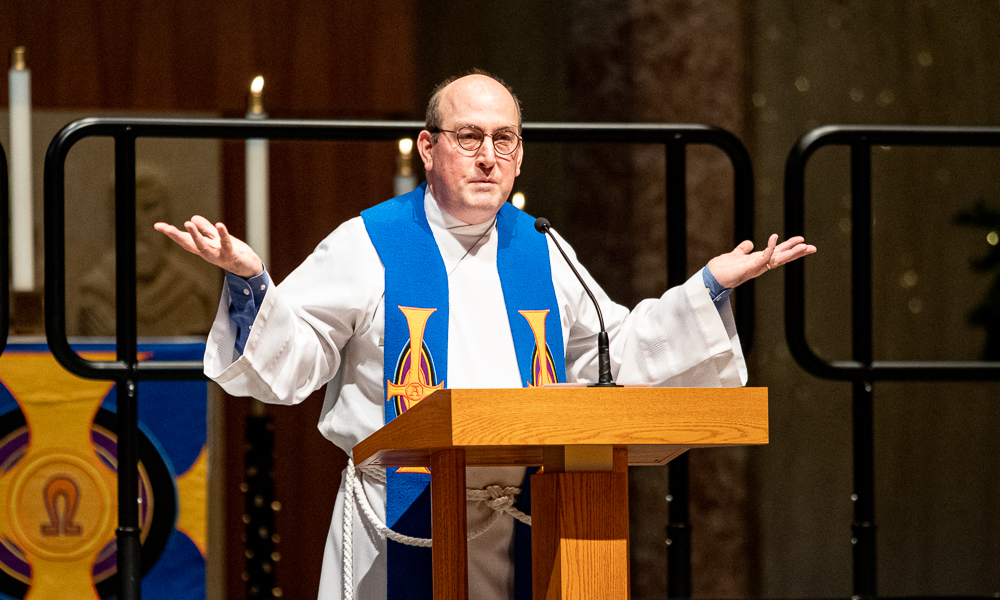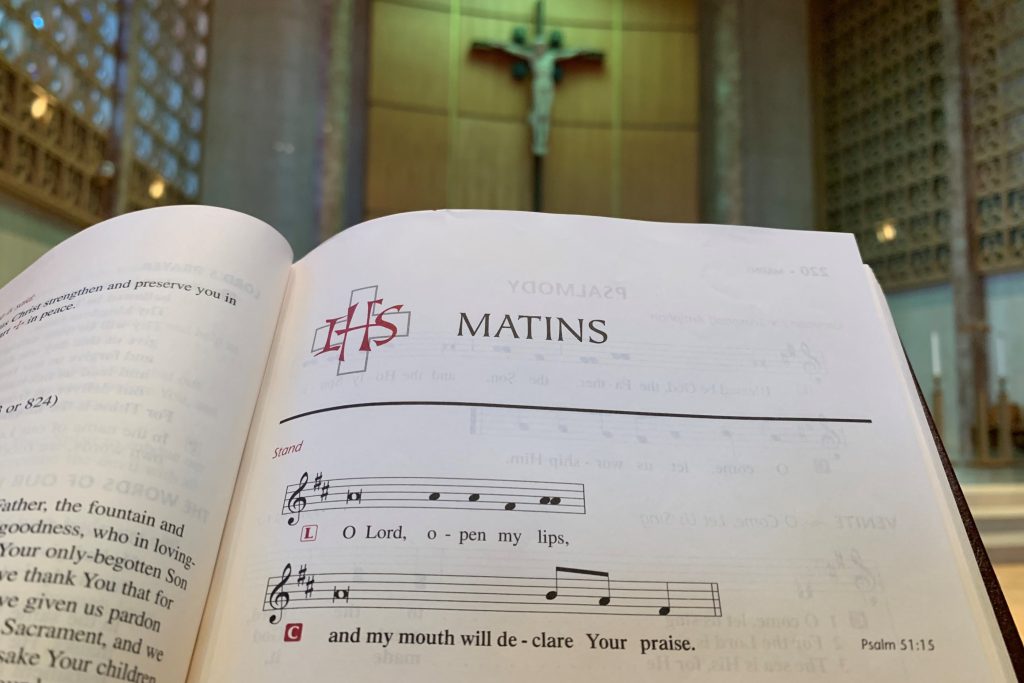
“… and my mouth will declare your praise.” A closer look at “our old friend, Matins,” with CUW Campus Pastor, Rev. Steve Smith.

If you’re new to the CUW daily Chapel experience, you may not be familiar with a particular type of service called “Matins.” I certainly wasn’t when I first came to Concordia about two-and-a-half years ago.
Some say it is characterized by “chanting”; but that’s not how I would describe it. To my ear it’s definitely singing, though perhaps the “melodies” aren’t necessarily as catchy as you might be used to, either in traditional hymns or contemporary Christian music.
Derived from the Latin word for “morning,” Matins refers to the ancient practice of different prayers for different times of day. It goes hand-in-hand with Vespers, which is an evening prayer, and a service called Compline, which is traditionally the last prayer of the day.
“The practice predates Lutheranism,” said Rev. Steve Smith, campus pastor for Concordia University Wisconsin. “Before the Reformation, monks in the monasteries would pray what were called the ‘hours of the day.’ They would pray literally every three hours; they would wake up in the middle of the night, have a prayer service, and then go back to bed. It was their way of ‘praying without ceasing,’ as described in Scripture.” (1 Thes. 5:17)
These days, however, Matins services are not as common in Lutheran churches as they once were, Smith said. But that’s just all the more reason to do them regularly here on campus.
“I feel that no matter where you come from, when you come to Concordia, your worship experience ought to be expanded,” he explained. “And Matins is a great traditional service that many people don’t know about.”
An ‘acquired taste’
Sometimes, when introducing a Matins service, Smith uses the analogy of drinking coffee. Not many people like coffee the first time they try it, he says. And it can be much the same with Matins.
“The first time many people have coffee, myself included, they think, ‘This is bitter and it’s not good! Why do people do this?’” Smith explained. “And if you take the time to get used to it, then it becomes that thing with which you can’t be without. Like, ‘I have to have this.’”
That certainly is how it worked for me. I was confused the first couple of times I attended a Matins service, but I took our pastor’s words to heart and stuck with it. I resisted the temptation to skip those services, and soon the confusion and uncertainty gave way to a familiar feeling of peace and contemplation. I found comfort in the words and the music, and began using the time to feel closer to God.
Coming from a church background that tends to push against the idea of anything that feels like a “ritual,” I’ve come to realize that great comfort can be found in doing some things essentially the same way every time.
Components of Matins
In that spirit, with some variations for different church seasons—such as Lent and Easter—the basic components of the Matins service remain essentially the same (quotes are from Pastor Smith):
Call to God
“This is essentially the introduction; there is no formal invocation in a Matins service. We call out to God that He would work in our hearts, that we can praise Him, that the glory would be to the Father.”
Psalmody
Defined as “the singing of psalms or similar sacred canticles, especially in public worship.”
- Antiphon: “a short sentence sung or recited before or after a psalm or canticle.”
- Venite: Latin for “come,” this section consists of five sung verses taken nearly word for word from Psalm 91:1-7. “O come, let us sing to the Lord ….”
- Office Hymn: A prayer from the hymnal generally chosen to fit thematically with the designated readings.
- Responsory: “This part is taken from Psalm 119 and Luke 11, giving glory to the Father. There are different ones that we use during Lent or Easter.”
Readings
“The Scripture reading is the pinnacle of the service, because that’s God’s Word. It is God’s Word purely spoken. We generally follow the Lectionary [verses prescribed by the church to read in a given week], and use that Psalm.
“In some traditions, the leader will chant or sing all the prayers and special petitions, so that the Scripture reading is the only spoken part of the entire service, which gives it additional emphasis.”
Canticle
Defined as “a hymn or chant, typically with a biblical text, forming a regular part of a church service.”
This can be the Te Deum (a hymn that begins, in Latin, Te Deum laudamus, meaning “We praise You, O God”), the Benedictus (the “Song of Zechariah” from Luke 1:68-79), or another canticle.
Prayer
- Kyrie: “This is a short prayer, derived from Mark 10:47, calling for God to have mercy.”
- Lord’s Prayer: As Jesus taught his disciples in Matthew 6:9-13.
- Collects (pronounced KAH-lect): “The idea of a collect prayer is that it attempts to collect all the thoughts of the day. There is a collect prescribed for each Sunday—the Collect of the Day—that attempts in a short way to reflect the theme of all that readings for that Sunday. It also introduces the special petitions, or ‘prayer requests,’ of the day. And then we finish with the Collect for Grace, which is very powerful.”
- Benedicamus: From Psalm 103:1 (“Bless the Lord, O my soul,”) “it literally means ‘let us bless.’”
- Benediction: “Most people are familiar with this word, but not its literal meaning. In Latin it means ‘Good Word.’ So it’s a good word, or blessing, from God.”
One sip at a time
Sound complicated? It’s not, really. The different parts are spelled out pretty clearly in the hymnal (page 219!) and Pastor Smith does a great job of leading the congregation through it. If it feels too mysterious or daunting the first time, just listen and pray. Don’t feel pressure to sing. Just be present in the House of the Lord and let the music, the Word of God, and the Holy Spirit wash over you.
Before you know it, you may just be saying, “I didn’t know I needed that!”
“Then all the people said, ‘Amen!” and praised the Lord.’ (1 Chronicles 16:36b)
Want in?
Daily Chapel services at Concordia University Wisconsin are at 9:30 a.m. Monday thru Friday in the Chapel of Christ Triumphant when school is in session. It’s just one of the many ways Christian worship and fellowship are incorporated into daily life on the CUW campus. To learn more, visit the Christian Life page at cuw.edu.